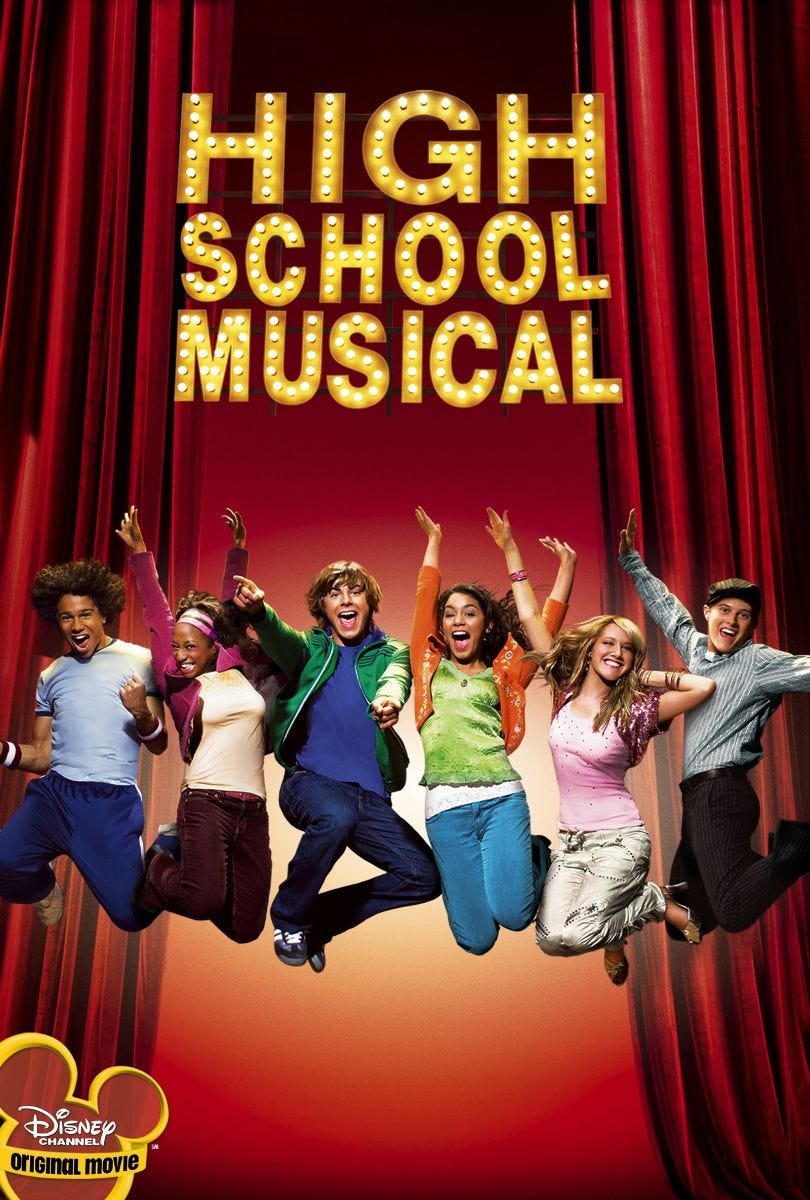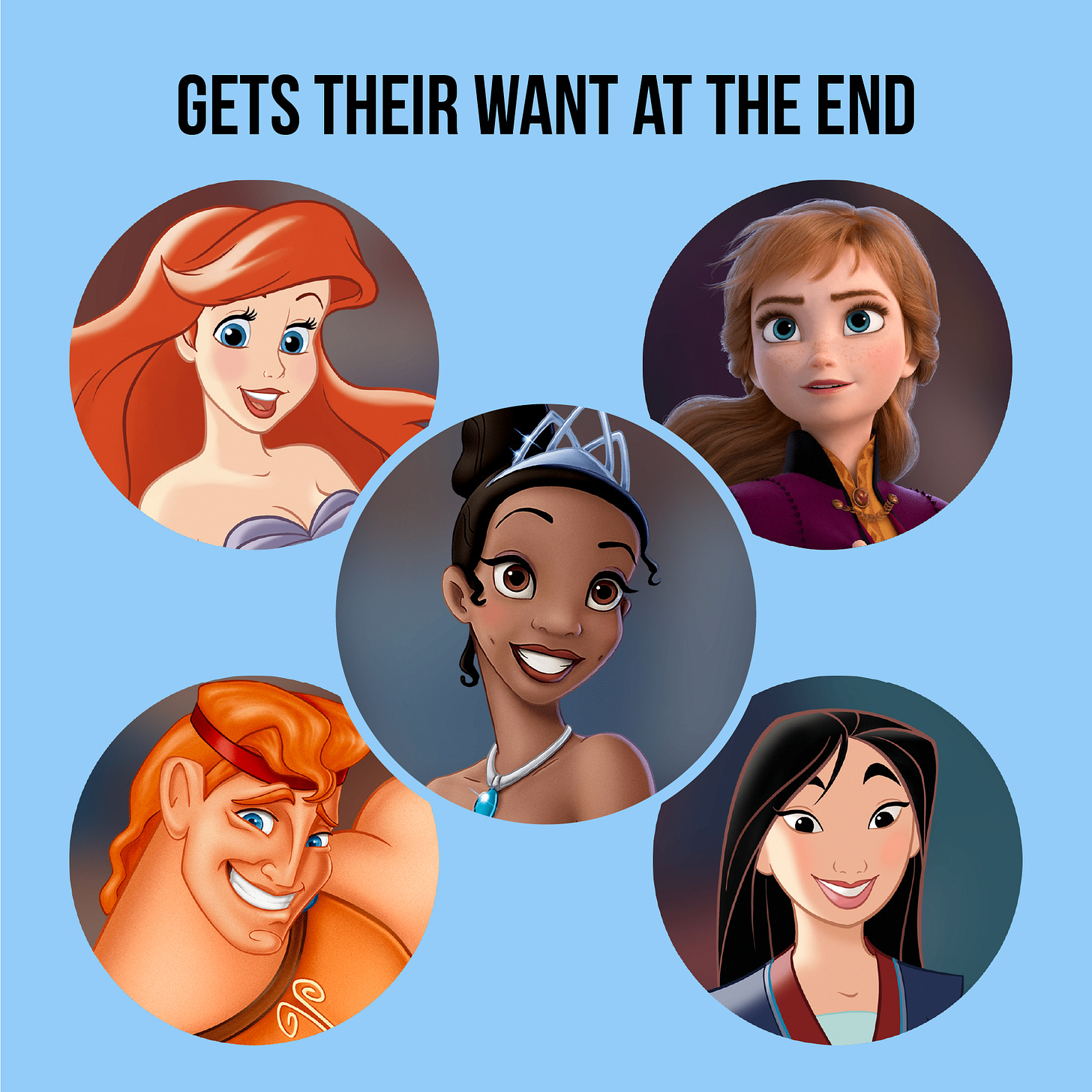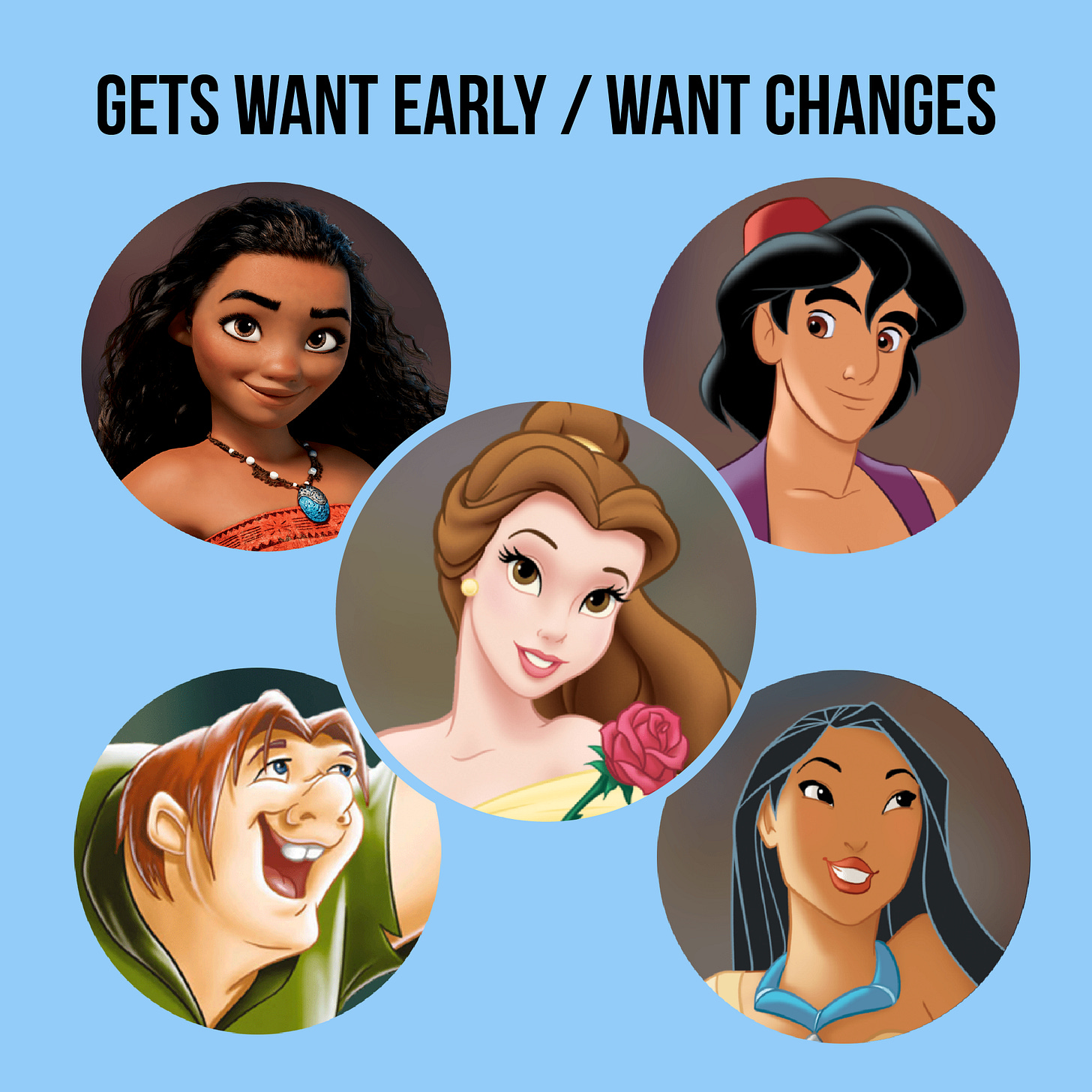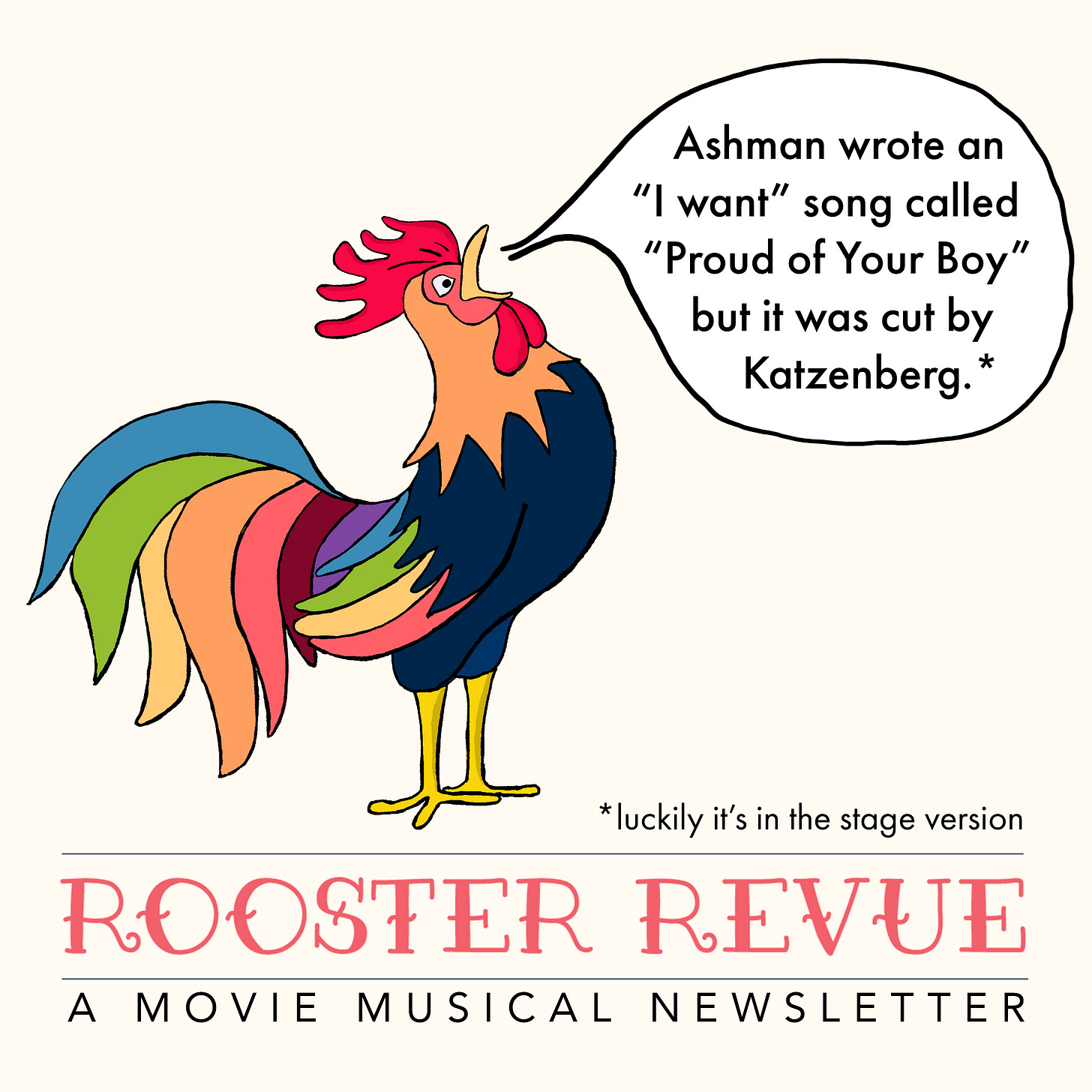Rooster Revue #4 • "I Want" to Read This Newsletter
A look at every "I Want" song from Animated Disney Movies.
Issue 4
In this issue we dive into the most delectable musical selections of Amazon Prime Video, Mary takes us back to high school with a love letter to High School Musical, and the Department of Cinemusicalization continues its examination of Disney animated musicals, taking a closer look at the films’ “I Want” songs.
• Broadway’s Diana: The Musical coming as a special presentation to Netflix in October BEFORE it reopens on Broadway. Cool marketing idea. [Deadline]
• Our favorite animated musical series, Central Park, just got renewed for season 3 by Apple. The first 3 episodes of season 2 premiere on Apple+ June 25. [Deadline]
• Best Summer Ever to open RealAbilities Film Festival. If you’re in NY check out the drive in screening. [Hollywood Reporter]
• Emma Thompson, Alisha Weir and more have joined the Netflix/Tristar adaptation of Matilda which apparently is going to be getting a theatrical release in the UK. Here’s hoping it’ll play theaters in California, too. [Hollywood Reporter]
• Paramount won a bidding war for Quinceanerx, an original musical from Kevin Lima about a genderfluid teen who wants a “quinceanera.” Love it already. [Deadline]
• ICYMI (11/20) Spike Lee is directing a musical chronicling the creation of Viagra (yes, you read that right) with music and lyrics from Stew Stewart and Heidi Rodewald. Passing Strange fans rejoice! [NY Times]
Footnotes (2016) [Prime Video]
A lighthearted French musical in the Jaques Demy style. Cute characters. Meandering story. Hot trucker. Worth knowing that the word “upgrade” somehow translates to “shut down the factory and move operations to China.”
Funny Girl (1968) [Prime Video]
Is there anything as perfect as Barbra Streisand’s turn as singer-comedian-star Fanny Brice? It’s an iconic role that launched her career. It’s also a great film adaptation. Starring: Barbra Streisand, Omar Sharif
Inspector General (1949) [Prime Video]
A favorite of our friends at Thicket & Thistle. Danny Kaye is a legend and this is one of his finest moments. There aren’t a whole lot of songs, but what’s in there is great. Don’t miss Danny singing a quartet with himself, or the party scene at the end with a flaming sword.
Lucky Stiff (2014) [Prime Video]
A low budget movie adaptation of the 1988 corpse farce from Ahrens & Flaherty (Once On This Island, Anastasia). A year before Weekend At Bernies, Lucky Stiff premiered Off-Broadway. Honestly, it makes every mistake an indie movie musical can make, but a great study into what not to do. Starring: Jason Alexander, Nikki James
Lemonade Joe (1964) [Prime Video]
Here’s another farce, a Western musical from Czechoslovakia that is so entertaining. The big difference between this and Lucky Stiff, is that I would call this pure cinema. Movie musicals have to be movies first—and directors from stage can’t always grasp that. The songs are mostly performances but they are motivated by the story so it gets our “musical” seal of approval. Note: there is a scene where a character wears blackface as a disguise. This could be a symptom of the Iron Curtain, or an attempt to critique American racism, but it’s the movie’s only downside.
Jeanette (2018) [Prime Video]
This musical retelling on the Joan of Arc’s childhood is beautiful to look at, but quite frankly, we just didn’t get it. We’re including it on the list because not everyone agrees as it holds a 79% on Rotten Tomatoes—and has a sequel, Joan of Arc, that was released last year. You be the judge.
Man of La Mancha (1972) [Prime Video]
An adaptation of the Broadway musical that we haven’t seen but it’s there.
Moulin Rouge (2001) [Prime Video]
Drink in Baz Luhrmann’s stunning Bohemian musical featuring reinvented pop classics and breathtaking production value. Starring: Nicole Kidman, Ewan McGregor
And a bonus ...
Little Shop Of Horrors (1960) [Prime Video]
No this is NOT the musical—but if you’ve ever been curious by the Roger Corman source material that inspired one of our favorite shows, it’s free to stream on Prime. Remastered in color.
High School Musical (2006) is a story about two high school juniors from rival stereotypical cliques.
Directed by: Kenny Ortega
Written by: Peter Barsocchini
Music & Lyrics: Various
Matthew Gerrard & Robbie Nevil
Andy Dodd & Adam Watts
Randy Petersen & Kevin Quinn
Jamie Houston
Almost exactly fifteen years ago, The Disney Channel released the cultural touchstone High School Musical (directed by the legendary Kenny Ortega). It quickly became their most successful original movie ever leading to two sequels, hit soundtracks and an international tour. It launched the careers of Zac Efron, Vanessa Hudgens and Ashley Tisdale and paved the way for other successful Disney musical franchises like Teen Beach Movie and The Descendents.
I revisited this iconic musical film on Disney+ and, surprising no one, still knew all the words to the anthemic “Breaking Free.” I wanted to pick up a basketball and dance along with “Get’cha Head in the Game.” The wholesome, blue-sky world of East High was like being wrapped in my favorite blanket with a cup of hot cocoa—comforting, sweet and heartwarmingly familiar.
The set up alone is fantastic—awkward teenagers literally find their voices together at a karaoke night, go on their seemingly separate paths but then are unexpectedly thrown together at high school a la Sandy’s surprise arrival at Rydell High in Grease. These star-crossed lovers try to resist their passion for singing as the shy bookworm Gabrielle (Vanessa Hudgens) sticks with the academics and Troy (Zac Efron) focuses on his role as the star basketball player. But their love for song (and each other) could never keep them apart.
It was blissfully refreshing to revisit the stakes of high school drama (on and offstage) while living through a traumatic pandemic in adulthood. To watch the chorus of high schoolers (clearly in their twenties) sing about sticking to the “status quo” when you know what lessons are waiting in the wings. When callbacks for the school musical are moved to the same exact time as the scholastic decathlon and championship game, I questioned if anything could matter more. And as kids from all cliques came together to help Troy and Gabriella get to callbacks in time, I believed in the power of teamwork and overcoming differences.
High School Musical may not be for everyone, but its impact on the movie musical genre is … okay it didn’t really change anything but it’s pure fun and I love it.
Also, below is my favorite meme of quarantine and I stand by it.
—Mary Bonney
Last week we struck a nerve when we said Aladdin doesn’t have an “I Want” song, AND we stand by it. Yes, the “One Jump Ahead” reprise serves the purpose, but it loses on the technicality that it doesn’t stand on its own. But we thought we’d take the opportunity to examine the “I Want” songs a bit closer.
First let’s ask what makes an “I Want” song an “I Want” song? In simple terms, it is what the character want at the beginning of a story. The protagonist “sings about what [they] want in life,” said Howard Ashman, “and the audience [...] roots for [them] to get it for the rest of the night.”
Let’s take a look at the song’s and wants of our protagonists. Please note, we consider Frozen to be Anna's movie and Frozen 2 to be Elsa's movie.
Some “I Want” songs lead a character all the way to the end. Ariel finally becomes human (or gets to stay human), Tiana gets her restaurant, Anna finally gets her sister back.
Other “I Want” songs just get them into the story—to be replaced by new wants. Moana wants to explore the ocean and within 15 minutes, she does. Then her want becomes saving her people. Jasmine answers Aladdin’s call of wanting someone to see him for who he is, and then his want for the rest of the movie becomes Jasmine. Belle’s want for adventure is answered very quickly and then becomes a prisoner of the Beast. Then Stockholm Syndrome kicks in. I guess you could say “love” ends up being the adventure but I’m not enough of a romantic to agree.
Some “I Want” songs get our character to the movie’s climax, leading them into a finale to get what they need. Elsa spends Frozen 2 seeking answers to her origin, then spends the 3rd act trying to right the wrongs of her family’s legacy. Flynn makes good by getting Rapunzel to the lights, but now she both wants Flynn and needs to understand her place in this world. Their want leads them to a deeper, more profound want.
The only example of a character abandoning a want is Simba, though he ultimately comes around. This is a good example of an initial “want” staying the same throughout the movie, but the understanding of what that want means changes as the character changes. At first he wants to be king because no one will tell him what to do. At the end he wants to restore peace and become a benevolent king.
Some “I Want” songs are refined over the course of the song, or in their reprises. When Ariel sings her reprise, the song changes from “part of that world” to “part of your world” meaning Eric’s world. Hercules goes from wanting a “hero’s welcome” to wanting to become a “true hero,” after finally meeting his father, Zeus.
Some “I Want” songs have sub-wants. Hercules wants to be a celebrated hero, but he also wants to belong. Belle wants adventure, but she also wants someone to understand her want of adventure—as expressed after the Gaston scene. Anna wants to build a snowman (joke).
While all “I Want” songs are about external goals, two stand out as closer to internal struggles. Aladdin and Mulan both want to be seen for their authentic selves, but systems of oppression are in place that keep that from being possible. For Mulan, it’s women’s place in traditional Chinese culture, for Aladdin, it’s poverty. The systems don’t change, but our characters transcend them.
In conclusion, it seems to come down to specificity of want. There are some characters who simply want more than the life they currently have, while others want something very specific. One certainly isn’t better than the other, but there is something worth noting about the satisfaction we feel as viewers when a character's want leads them to a deeper understanding of what they need.
Help us reach more Movie Musical lovers and forward this email to anybody you think may love it! This is our first issue and we're excited to build our audience.
Was this forwarded to you? Subscribe Here.
ABOUT THIS EMAIL
Rooster Revue is edited by Matt Andrews, Mary Bonney, and Jeffrey Simon with contributions from the entire team at The Barn.


















